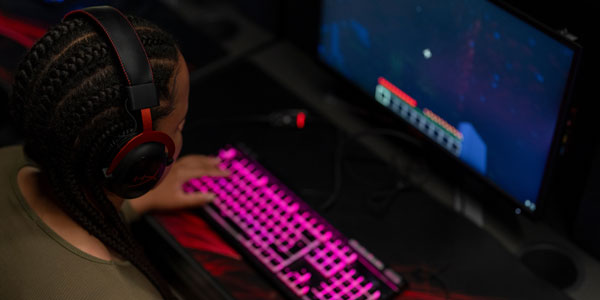Hooked on games and the silver screen
- Leanne Rencken
What is it about TV and film that’s so compelling that we can’t resist immersing ourselves in celluloid?
Binge-watching series? Obsessed with Netflix’s latest blockbuster? Human beings have ardently consumed TV and film for decades, and it’s the storytelling behind the medium that gets us hooked. Remember Scheherazade? The character and storyteller in the Middle Eastern collection of tales known as the One Thousand and One Nights, in which the sultan takes a new wife each night and has her executed the next morning.
Scheherazade survives by telling the Sultan stories every night. Her early adoption of the cliffhanger – a plot device in which a part of the story ends unresolved in a shocking or suspenseful way – saved her life.
The same thing that kept the sultan entranced is what keeps us glued to our screens today; how the narrative of shows is crafted, and its delivery are as important as the plot. Similar rules apply, whether we’re watching TV and film, or playing a video game.

Connection and escapism
But there’s more to our screen addiction than good storytelling. Lecturer in the Film and Television Department at Wits, Jurgen Meekel, speaks about the duality of connection and escapism, and how the medium offers both. People can either watch the news via a plethora of 24-hour current affairs channels or use film and TV services to escape reality.
This was especially true during the 网易体育 lockdown; Nielsen reported early in the pandemic that “home-bound consumers led to a 60% increase in the amount of video content watched globally”.
Kieran Reid, Head of Wits Digital Arts, expands on the notion of reality and escapism and how games allow for a semblance of control. He says, “Our goals in life are really complicated and not so clear cut; you have no idea if you have the right tools to do what you need to do, whereas a game gives you a clear way of engaging and a core set of rules, and those rules are the correct rules to help you achieve your goal.”
In addition, Reid explains that people keep playing games because they are competitive. “Whether you are playing against yourself or an opponent, there’s a sense of achievement in success, which is rewarding.”
Whether they are games that can be played socially with several people, or that are played solo on a mobile device, success in these games is a compelling reason to keep coming back to them.
“As a department, we are very interested in understanding play and facilitating interactions, so the students are constantly designing ways in which people will engage with their product, and obviously, in some ways, that’s about manipulating them to stay longer, to enjoy themselves, and to make sure the interactions lead to more interactions, so that they keep coming back,” says Reid.
More media that mirrors
Unlike gaming, when it comes to film and television, the appeal of the win does not apply. However, social media has brought in an added dynamic to our compulsion to watch a show or series. ‘Discovering’ new content from the ever-expanding pool, before it trends, and making good recommendations translates to solid social currency, whose reward is the potential to give someone influencer status. In this example, both the influencer and the influenced become keen followers of a particular programme.
“There’s a huge difference in the way we consume broadcast media and games today, but also how we make film and TV. The audience has become more versed with the creation of media, they’ve become experts, so the creators have had to develop more intelligent stories, deepen their characters, and include multiple narrative arcs, which I think is most interesting,” says Meekel.
He also notes the democratisation of the media, with more representation of audiences and their lives in programming. This has led to streaming services clamouring to create and broadcast ‘local’ content. Ideally this will lead to more opportunities for students in his department.
How we watch and play
But it's not just the amount, or types of content that have increased – how we watch has also changed dramatically. Since its launch in South Africa in 1976, television has had mass appeal. Now, with 72% of the South African population connected to the internet, streaming media is easier than ever. Despite the high cost of data, Google reports that YouTube ads, and by extension YouTube content, reached over 42% of the South African population in 2023.
Streaming services including Netflix understand the appeal of Scheherazade style story telling in pulling in viewers. Pilots are no longer the hook for television series and for this reason, streaming platforms prefer the series dump, enabling us to become addicted to our favourite (or favourite hate) characters, which research shows is by around episode three or four, and binge watch until we’ve had our fix.
More on this research
BLNK is a screening series where directors, writers and producers come to show work and discuss it with students. BLNK facilitates Film and TV Department Cinema screenings, which are occasionally open to the public. For details, email pervaiz.khan@wits.ac.za.
- Leanne Rencken is a freelance writer.
- This article first appeared in?Curiosity,?a research magazine produced by?Wits Communications?and the?Research Office.
- Read more in the 16th issue, themed: #Drugs, where we highlight the diversity, scope, and multi-dimensional nature of drug-related research at Wits University.
